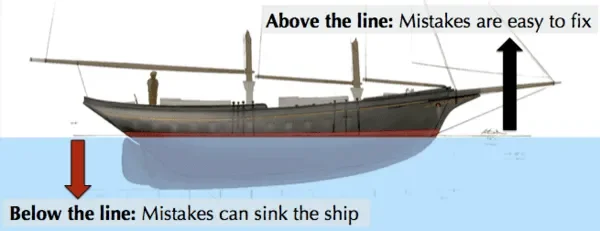Make your employees happier this week - do nothing
I don’t remember any of the work I did at school, except one essay.
It was a biology essay I wrote in the lower sixth (Year 12). I don’t remember the topic but I can still see it, it was about a page and a half, and when the teacher gave it back to me it had no red marks and just one comment: “Great. 10/10.”
I remember going to see the teacher, Mr White, afterwards and asking him if there was anything I needed to improve. He said “No - it was perfect.”
I was elated. My first ever 10/10 in biology. I can’t remember what I had for breakfast yesterday but I can still clearly remember that moment.
The following week Mr White set another piece of homework. As we were walking out of the classroom he pulled me aside and explained what I could have done better with the last piece of work. I asked him why he hadn’t told me that the previous week. He said he’d seen how happy I was with my grade, and he hadn’t wanted to spoil it.
Me, a few years earlier - I’m the one in the middle with the haircut.
That lesson has stayed with me.
As leaders, parents, and teachers, we face the same dilemma: when to step in and when to let go.
Our instinct is to help, to give “feedback”:
We’re given a report - we add comments.
We’re shown a plan - we make suggestions.
We watch a presentation - we explain how it could have been a little better.
We can’t help ourselves.
We think of it as feedback. But often our intervention doesn’t help them produce better work. It sends the message: “I don’t trust you. You’re not quite good enough.” And when people feel that, they stop taking risks. They stop growing.
It’s a fine balance. I get it. I used to lead a big team and I found it very hard to let go. I didn’t want them to make any mistakes. In the end, a useful mental model that helped me was WL Gore’s waterline principle.
At WL Gore they believed in giving their employees a lot of autonomy but with limits, and any idea had to pass the waterline test.
Imagine the company is a boat, if the idea is above the waterline, let the team get on with it. If it fails it can be patched up later and we can all learn from the experience.
If the idea is below the waterline and could sink the boat you need to get approval first.
Tip of the week
If someone in your team gives you something that is good enough and is not going to cause any serious downsides. Do nothing.
No comments, no advice, no “feedback”.
Just say it is great.
It will build confidence, show trust, and help people take another step towards autonomy. And yes, it will make them happier.
According to the US Surgeon General, feeling trusted and in control of how you work is one of the five essentials of wellbeing at work. It meets your human need for autonomy and flexibility.
Follow the blog
I regularly write on how you can use the science of happiness and the science of wellbeing to improve team performance. Sign up now to receive the latest blog posts in your inbox.



